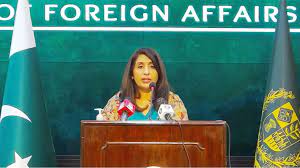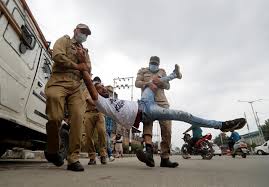Pakistan condemns India for seizing properties of Kashmiri activists in IIOJK

Celina Ali
Islamabad: Pakistan on Thursday strongly condemned India for confiscating the properties of Kashmiri activists and human rights defenders in the Indian Illegally Occupied Jammu and Kashmir (IIOJK).

“We are concerned about the recurring acts of confiscation of properties by India in IIOJK,” the Foreign Office spokesperson said at a weekly press briefing.
Spokesperson Mumtaz Zahra Baloch said India’s National Investigation Agency and the State Investigation Agency (SIA) had moved “aggressively” to seize immovable properties of several Kashmiri activists.
“It is concerning that just SIA has attached 124 such properties since its establishment in 2021,” she said.
She said, “We condemn India’s recent move to confiscate the property of All Parties Hurriyat Conference Spokesperson and Tehreek-e-Hurriyat leader, Ayaz Akbar, in Srinagar.”
Akbar remains behind the bars since 2017 on fictitious charges.
The FO spokesperson said India must end dispossessing the political leaders and human rights defenders of their rightful properties.

“Kashmiris are the rightful heirs to their own land. It is unfortunate that non-Kashmiris are being encouraged to buy land and property in the disputed territory while the properties of Kashmiris are being confiscated and destroyed,” she said.
During the ongoing visit of Prime Minister Shehbaz Sharif to Azerbaijan, she said, the two sides would exchange views on diverse areas of bilateral cooperation including in energy, culture, banking, education, defence, information technology, science and technology, and trade and investment.
Also, the two countries would sign a programme of cultural cooperation and a Memorandum of Understanding on cooperation between the foreign service academies of Pakistan and Azerbaijan.
The FO spokesperson said the 12th round of Pakistan -Iran Bilateral Political Consultations (BPC) would be held in Tehran on June 17-18 June.

The Foreign Secretary will lead Pakistani delegation while Deputy Foreign Minister for Political Affairs of Iran, Ali Bagheri Kani will lead the Iranian side, she said.
Baloch said regarding the progress on implementation of decisions of last session, the BPC would review all aspects of Pakistan-Iran bilateral relations covering political, economic, trade, investment, border security, education, climate change and culture domains.
She said the two sides would also hold discussions on regional situation particularly Afghanistan, Kashmir, resumption of Iran-Saudi Arabia diplomatic ties and regional peace and stability.
The two sides will also discuss progress on institutional frameworks to promote ongoing cooperation in all areas of mutual interest, she said.
In Tehran, the foreign secretary will call on the Iranian Foreign Minister and address the Institute of Political and International Studies. He will also hold meeting with Secretary General of Economic Cooperation Organization (ECO) and Chairman of Pakistan -Iran Parliamentary Friendship Group. The last meeting of BPC was held in Islamabad in October 2021.
The spokesperson said the second round of Pakistan-Belgium Bilateral Political Consultations is being held in Islamabad today. Additional Foreign Secretary (Europe) Ambassador Muhammad Saleem will lead the Pakistan side while the Belgium delegation will be led by Ambassador Cooreman, Director General, Bilateral Affairs, Ministry of Foreign Affairs, Belgium.
“The two sides will review the entire spectrum of Pakistan-Belgium relations and set the agenda for bilateral engagement and cooperation for the next year,” she said.
Pakistan and Belgium, she said, would discuss collaboration at international forums, including at the UN, and important regional and global developments. This year marks the 75th anniversary of the establishment of diplomatic relations between Pakistan and Belgium.

“Pakistan remains committed to further deepening and broadening its ties with Belgium in the areas of trade, investment, academic and cultural cooperation, tourism and labor mobility,” she said.





